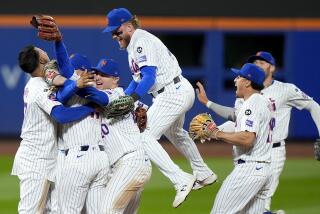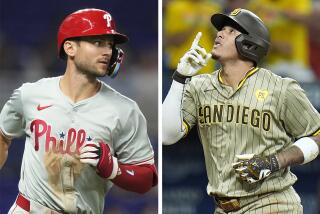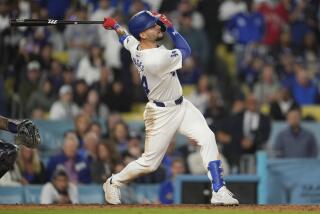The Dodgers’ Old Nemesis Is Back Again : The Uniform Has Changed, but Brooks Still Kills L.A.
- Share via
Consider the evidence: The smoking bat. The bullet-riddled pitchers. The spent shells piled up around him on the right-hand side of the batter’s box. The notches on Seymour Siwoff’s calculator.
This man’s face belongs on a wanted poster, not on a bubble-gum card.
Name: Hubie Brooks.
Occupation: Shortstop, Montreal Expos.
Description: Extremely dangerous--at the moment, the National League’s leading home run hitter.
Reputation: Dodger Killer.
Reward: Everlasting gratitude from the Dodger pitching staff.
Some men would die for such notoriety. Some men have.
Not Hubie Brooks. He’s too practical for that.
Dodger killer? Don’t make him choke on the chicken he was eating at a Long Beach restaurant Monday afternoon, not far from the Compton home in which he grew up.
“I hate that,” Hubie Brooks said. “I hate labels. People with labels, they get hunted. Even during the Western days, people with the big names, they got hunted. Everybody wanted to kill Billy the Kid.”
Brooks would rather people save their shots for somebody else, even though he’s the one who’s batting .371 lifetime against the Dodgers, with 4 home runs and 35 runs batted in. All he did last season was hit .404 against Los Angeles. The first game against the Dodgers this season, he doubled, tripled and hit a home run.
When Brooks arrived Tuesday in Chavez Ravine for the first of three games the Expos are scheduled to play here, the Dodgers should have assigned a bodyguard to Rick Honeycutt, who has faced Brooks 15 times and given up nine hits.
But Brooks doesn’t want to be known as a hired hit man, especially in his own backyard.
“People ask me, but I don’t know what it is,” Brooks said of his phenomenal success against the Dodgers.
“They’re tough. It could be that I know people here are listening to the games and I give a little bit more. Maybe I reach back and give a little more. Maybe the adrenaline flows a little more.
“There are people here that you want to make proud of you. Like (Mike) Fitzgerald (the Expos’ catcher who grew up in nearby Lakewood). He plays well here, too.”
And besides, how ferocious could someone named Hubie--Hubert Brooks Jr.--really be?
“I got it from my father,” Brooks said. “I like the name.”
But go ahead, name a famous Hubert.
All right, there was Hubert Humphrey.
“Hubie Green, the golfer,” Brooks said.
“Hubert the comic strip. Hubert in the bathtub. Mr. Bubbles, remember that?”
No one has ever called Brooks Mr. Bubbles. But they did have another label for him after he first came up with the New York Mets at the end of the 1980 season: Moody.
“I just wasn’t like everybody else,” he said. “If you played on teams that lost 100 games every year, wouldn’t you be moody? Would you have fun every day? Would you want to come to the ballpark all the time? No way.”
Soon enough, that tag was dropped when the Mets started winning. And Brooks, the 68th player tried at third base by the Mets, flourished. He hit .307 as a rookie, batted .354 with runners in scoring position in 1983, and had a club-record 24-game hitting streak in 1984.
But then, in December of 1984, came another label: Traded.
In perhaps the biggest deal of the decade, the Expos sent catcher Gary Carter, the most celebrated--not to mention, wealthiest--player in their history, for four Mets.
Brooks found out which Mets when he arrived home in Irvington, N.Y., a suburb of New York City, and flipped on the Monday night football game on TV. The Raiders were playing; that’s all he recalls about the game.
“O.J. Simpson and those guys said, ‘A big trade has been made,”’ Brooks said. “I turned the radio on, and they said, ‘Mets land superstar player.’ I said to myself, ‘I wonder who we got.’ Then they put the names (of the Mets who were traded) on the TV screen.”
The names: Pitcher Floyd Youmans. Outfielder Herm Winningham. Fitzgerald. And Brooks.
Shocked? Bet on it. Especially since Brooks, at the request of Manager Davey Johnson, had switched in late August from third base to shortstop, a position he hadn’t played since college, to make room for the newly acquired Ray Knight.
“At the time, we were three or four games out of first, chasing the Cubs,” Brooks said. “What do you do? Say no for personal reasons, and the team won’t be as well off in the middle of the pennant race, or do it?
“I think a lot of guys would have said no. I think that’s the only reason I said yes.”
And for his willingness, the Mets gave Brooks reason to believe he was their shortstop to stay.
“That’s what made it that much more shocking,” he said. “They tell you that you’re one of the untouchable guys on the team, and then a week and a half later they trade you. You’re not going to like that.
“The only disappointing thing is to have to leave a good team to go somewhere else, when you were there when the team was absolutely nothing. From Square One. We were bad.”
The feeling in Montreal, at least as Brooks interpreted it in the Montreal media, is that the Expos were getting someone who preferred to remain on the other side of the border.
“They made it seem like I was ticked off at everybody, that I was bitter and hurt,” Brooks said. “I was never bitter and hurt. It takes a lot to make me bitter and hurt at the same time.”
There was, however, an adjustment--and it had nothing to do with picking up enough French to order off a menu.
As the key player on the Expos’ side of the trade, Brooks had to show the skeptics that Canada hadn’t been ripped off by American sharpies again. And he had to prove he belonged on the team at a position--shortstop--he wasn’t so sure he belonged at.
“I had a terrible spring training,” Brooks said. “For the first three weeks, I’ll be honest with you--I don’t think I caught a ground ball.
“It got so bad, comments were being made by certain people who weren’t happy with the way I was playing, and they’d just traded for me. I wasn’t happy with the way I was playing, either.
“I went to them and said, ‘Tell me what you want me to do, and I’ll do it.’ They said, ‘We need someone to drive in some runs.’ ”
The Expos wanted a cleanup hitter more than a shortstop. They ended up getting both. Brooks drove in 100 runs, the most by a shortstop since Ernie Banks in 1960--and the same number Carter drove in for the Mets.
And though he made 28 errors, Brooks displayed a strong arm and more than adequate range. He figures he’s still being charged for errors because official scorers have been slow to consider him a shortstop.
He’s not Ozzie Smith, but ask him where he ranks himself among National League shortstops, and Brooks isn’t shy.
“The top three,” he said. “I like (Garry) Templeton and Ozzie Smith. Most of the other shortstops in the league are first- or second-year players.”
They may never let Brooks forget Carter. One day in spring training, someone left Carter’s baseball card on Brooks’ stool.
“That doesn’t matter,” Brooks said. “Where you get in trouble is when you try to outdo somebody or outplay somebody.”
At the moment, Brooks, who never has hit more than 16 home runs in a season, is outdoing every power hitter in the league. He has a league-leading 10 home runs, along with a league-leading 32 RBIs and a .354 average, second in the league.
He can’t explain the power surge.
“I’m not trying to hit them,” he said. “I’m just swinging the bat well, and seeing pitches well.”
And if the Expos’ pitching stands up, he also sees Montreal challenging his former team for the division title in the NL East.
So, who does he think got the better of the deal?
Brooks smiles. “Four players for one--that’s a helluva lot,” he said.
“I’m here, playing well. Fitzgerald’s here, playing well. Floyd’s pitching well. And Herman’s here. All of us are here.”
And one of them is a Dodger-killer. Tom Lasorda, beware.
More to Read
Are you a true-blue fan?
Get our Dodgers Dugout newsletter for insights, news and much more.
You may occasionally receive promotional content from the Los Angeles Times.









